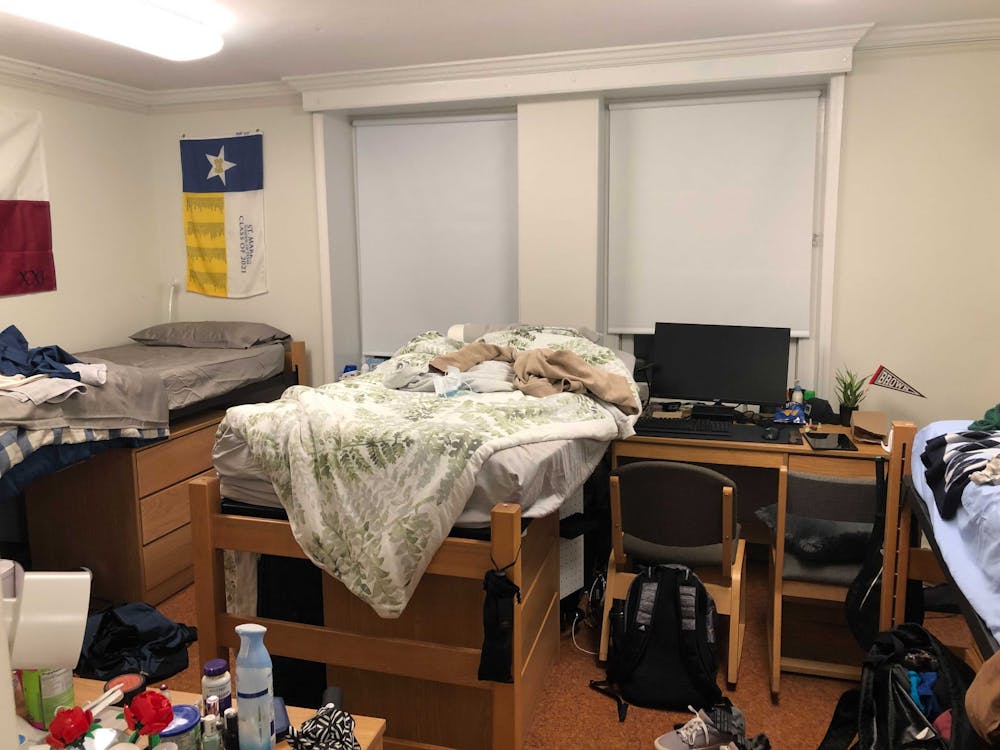Since moving to campus at the beginning of the fall semester, some first-year students have cited issues with their residential experience at Brown. The issues range from lack of communication to insufficient support to being assigned to forced triples — rooms that are normally occupied by two residents but currently host three.
Forced triples
Associate Director of Residential Operations and Communications Nick Greene said that the need to assign some students to forced triples stemmed from a large first-year population on campus this year and in recent years.
Greene added that “only rooms with sufficient space for students and furnishings are assigned as triples.
But some first-year students said that their forced triple dorm rooms lacked sufficient space for them to live comfortably, becoming detrimental to their residential experience.
One such student, Sam Schwartz ’25, who is currently living in a forced triple in Andrews, said that between him and his two other roommates, “we have three desks in a room and three beds and about 15 square feet of standing room.”
Sherry Zhang ’25, a student who is also living in a forced triple in Andrews, noted that while she felt mostly comfortable with the arrangement of her room, her friends living in smaller-sized forced triples within Andrews feel constrained by the tight space.
“I’ve been to another (forced triple) and it’s really tight,” Zhang said. “There is barely any room to walk around.”
Lack of communication
Aside from the spatial inconveniences, many students also commented on the Office of Residential Life’s lack of communication when being told they would have to live in a forced triple.
Zhang stated that even though an overall lack of communication from ResLife was a commonly shared experience among students living on campus, she and her friends were frustrated by how late in the summer they actually received their housing assignments, giving them little time to prepare.
Vatsal Vemuri ’25, who is also living in a forced triple in Andrews, agreed that the late release of the housing assignment was a source of anxiety.
“We didn’t know our roommates until two weeks before moving in,” said Tara Hislip ’25, who was initially assigned to live in a forced triple in Miller.
Hislip said that she ultimately received a new housing assignment after requesting a room change from ResLife earlier in the semester. She noted that living in a forced triple was a factor influencing her request.
Hislip added that lack of communication from ResLife persisted even as she navigated the room change process, entailing several periods of waiting and many back-and-forth emails.
Greene wrote that ResLife actively works to support “the particular needs of first-year students” through its First Year Experience and Houses team, which communicates with first-year students “before their arrival, during orientation and beyond to establish a sense of community."
Still, some students felt that the support for first-year students currently in place was insufficient at times.
“My biggest frustration with it was I knew by the third day of being here that I needed to move,” Hislip said. “It was impossible for me to even submit a room change request until Sept. 24 when I knew I wanted to move already on Sept. 3. I had to wait for three weeks to even request to move.”
Upon inquiring about a room change, Hislip was told that ResLife would follow up with her in an email containing a form to fill out. But she never received that email, instead having to find the form herself on the ResLife portal. It wasn’t until she was ultimately matched to a new room, she said, that she received communication from ResLife directly.
“I was constantly emailing my Area Coordinator and my RPL to talk about my situation and get myself moved. They are not very communicative as a department,” Hislip said. “They don’t really communicate with the people living here.”
Changes to residential support
While acknowledging the difficulty of living in a forced triple, Vemuri noted that it seems ResLife is doing the best it can amidst frequent change caused by the COVID-19 pandemic.
“They’ve been reasonably on top of things and have been communicating pretty well,” Vemuri said. “Especially in such a weird time like this I’ve really felt taken care of by ResLife.”
Greene noted that ResLife is actively working toward better supporting the student community by way of enacting internal changes.
"The Office of ResLife is engaged in a process of reimagining the residential experience to support the development of inclusive communities, promote student health and wellbeing and advance students’ growth and development,” he wrote. Greene explained that ResLife is creating “specialized teams” designed to support specific aspects of the residential experience at Brown.
But some students noted that based on their experiences with ResLife as first-years, their hopes for successfully navigating the residential experience at Brown are low.
“Generally, I think (ResLife) just meets expectations,” Hislip said. “You really have to advocate for yourself in a lot of things.”
Seoeun Choi is a staff writer in Arts & Culture and University News. She is a junior from Frankfurt, Germany studying comparative literature (English, German, Korean) and history.





